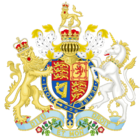Ecclesiastical Titles Act 1851 facts for kids
| Act of Parliament | |

|
|
| Citation | 14 & 15 Vict. c. 60 |
|---|---|
| Other legislation | |
| Repealed by | Ecclesiastical Titles Act 1871 |
|
Status: Repealed
|
|
| Act of Parliament | |

|
|
| Long title | An Act to repeal an Act for preventing the assumption of certain Ecclesiastical Titles in respect of places in the United Kingdom. |
|---|---|
| Citation | 34 & 35 Vict. c. 53 |
| Dates | |
| Royal assent | 24 July 1871 |
| Commencement | 24 July 1871 |
| Other legislation | |
| Repeals/revokes | Ecclesiastical Titles Act 1851 |
|
Status: Current legislation
|
|
| Text of the Ecclesiastical Titles Act 1871 as in force today (including any amendments) within the United Kingdom, from legislation.gov.uk | |
The Ecclesiastical Titles Act 1851 was a law passed by the British Parliament. It made it illegal for anyone outside the official "United Church of England and Ireland" to use religious titles like "Bishop of London" for any city or place in the United Kingdom. The law also said that any property given to a person using such a title would be taken by the government.
This Act was created by Prime Minister Lord John Russell. It was a reaction to strong feelings against Catholics after Pope Pius IX set up new Catholic areas (dioceses) in England and Wales in 1850. The 1851 Act did not work well and was cancelled 20 years later by the Ecclesiastical Titles Act 1871. Even though the law existed, Roman Catholic bishops often followed the rules carefully, but their followers usually ignored them. This situation actually made the Catholic Church in England stronger, even though it felt unfairly treated.
Understanding the Law
The Reformation in England was a time when the official Church of England separated from the Roman Catholic Church. However, the Church of England kept a similar structure with bishops and dioceses, like the Archbishop of Canterbury. In Scotland, the Reformation led to a different church, the Church of Scotland, which did not have bishops. In Ireland, the official Anglican Church of Ireland was set up like in England, but most people there remained Roman Catholic.
For a long time, laws called Penal laws stopped Roman Catholic bishops from living in Britain or Ireland. Later, laws like the Roman Catholic Relief Act 1829 gave Catholics more freedom. However, this 1829 Act still said that Roman Catholic bishops could not use the same names for their dioceses as the Anglican ones. In Ireland, these rules were often ignored because Catholic dioceses had always existed there, using the same names since before the Reformation.
Catholic bishops in England were first given titles from places outside England. Later, they were given English titles, but for places that were not already Anglican dioceses. For example, instead of "Bishop of Bristol," they might be called "Bishop of Clifton." However, when Westminster was chosen as the main Catholic diocese in London, some people saw it as a challenge. This was because Westminster Abbey was a very important place for the Church of England.
In 1850, Pope Pius IX created new Catholic dioceses in England and Wales. Many people in Britain saw this as an act of "papal aggression" (meaning the Pope was being too forceful). This led to protests and some unrest, especially in November 1850. Many Protestants asked the Queen to stop this "papal aggression." There were also strong feelings against a group within the Church of England called the Oxford Movement. Some people from this movement became Catholics, and they were seen as disloyal.
The Ecclesiastical Titles Act 1851 was passed because of these events. It made it a crime for anyone outside the Church of England to use a bishop's title for any city or place in the United Kingdom. It also said that any property linked to such a title would be taken by the government. The law did make an exception for the Scottish Episcopal Church.
However, the Act did not achieve its goal. The Roman Catholic community continued to use the traditional titles unofficially. The bishops themselves were careful to follow the exact words of the law. No one was ever punished under this Act.
Why the Law Was Cancelled
The Ecclesiastical Titles Act 1851 was cancelled in 1871. This happened under the Liberal government led by Prime Minister William Ewart Gladstone.
The new law, the Ecclesiastical Titles Act 1871, clearly stated that cancelling the earlier Act did not mean the Roman Catholic Church in England had any official legal power or authority in the United Kingdom. These powers, according to British law, belong to the Crown (the government and monarch).
 | Delilah Pierce |
 | Gordon Parks |
 | Augusta Savage |
 | Charles Ethan Porter |

